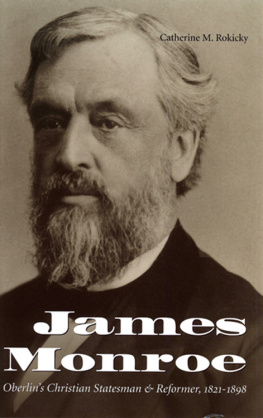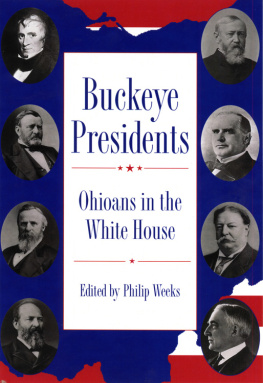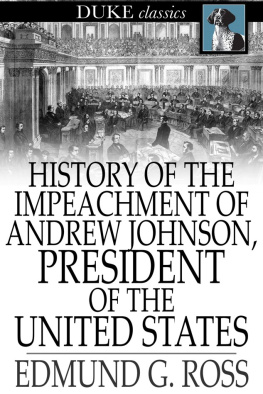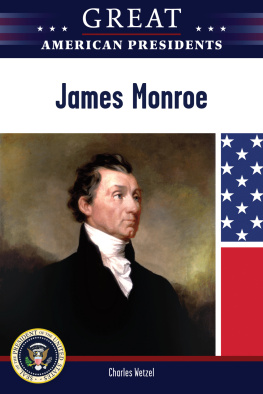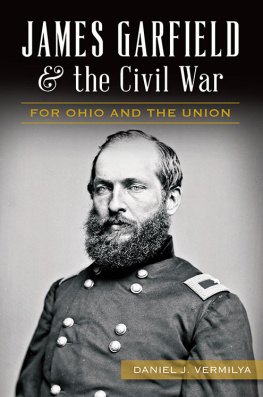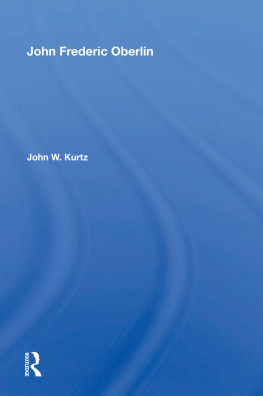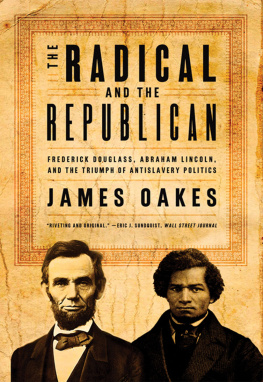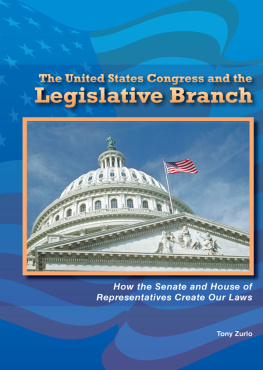James Monroe
James
Oberlins
Christian
Statesman
& Reformer,
18211898
Monroe
Catherine M. Rokicky
The Kent State University Press
Kent & London
Frontispiece: James Monroe, congressman. Oberlin College Archives
The Kent State University Press
Kent and London
2002 by The Kent State University Press, Kent, Ohio 44242
All rights reserved
Library of Congress Catalog Card Number 2001000960
ISBN 0-87338-717-1
Manufactured in the United States of America
07 06 05 04 03 02 5 4 3 2 1
Library of Congress Cataloging-in-Publication Data
Rokicky, Catherine M., 1967
James Monroe: Oberlins Christian statesman and reformer,
18211898 / Catherine M. Rokicky.
p. cm.
Includes bibliographical references and index.
ISBN 0-87338-717-1 (pbk.: alk. paper)
1. Monroe, James, 18211898.
2. StatesmenUnited StatesBiography.
3. LegislatorsUnited StatesBiography.
4. United States. Congress. HouseBiography.
5. Social reformersUnited StatesBiography.
6. CongregationalistsUnited StatesBiography.
7. LegislatorsOhioBiography.
8. EducatorsOhioBiography.
9. Oberlin CollegeBiography.
10. United StatesForeign relationsBrazil.
I. Title.
E664.M9 R65 2002
973.5092dc21
2001000960
British Library Cataloging-in-Publication data are available.
For Paul , with love
Contents
The completion of this manuscript required the help and encouragement of many people to whom I am grateful. The staff of the Oberlin College Archives merit special thanks for welcoming me into their facility for many months while I utilized their vast and interesting collections. Roland M. Baumann, archivist at Oberlin, introduced me to the James Monroe collection and graciously offered me his assistance. Brian A. Williams, former assistant archivist, helped greatly with his knowledge of Oberlins collections and, along with Tammy Martin, made the Goodrich Room a friendly working environment. I also thank the Oberlin College Archives for the Frederick B. Artz Research Grant, which greatly aided my work.
Thanks must also be extended to William H. Davis of the National Archives, who thoughtfully prepared the materials I needed in advance to expedite my research. Thanks also goes to the staffs of the Library of Congress, Rutherford B. Hayes Presidential Library, Yale University Library, New York Public Library, Ohio Historical Society, State Library of Ohio, Western Reserve Historical Society, State Historical Society of Wisconsin, Syracuse University Archives, and Wellesley College Archives.
Frank L. Byrne, my doctoral adviser and dissertation director, deserves special thanks, as he provided me with key insights and criticism as well as encouragement throughout my studies at Kent State University and the completion of this work. His zeal for history is quite contagious and appreciated. I also extend much appreciation to another mentor and a dear friend, Leonne M. Hudson, who offered much advice, support, and concern at critical points of my research. Thanks also to Allan Peskin of Cleveland State University, who first heightened my interest in the history of Oberlin College in his Civil War class. I appreciate his helpful critique of the manuscript. Clarence Wunderlin informed me of Monroes influence on progressive reform.
I would like to thank the very professional and helpful staff at The Kent State University Press for their efforts in preparing this manuscript. Special thanks go to John Hubbell, Director Emeritus; Erin Holman, managing editor; Perry Sundberg, editorial assistant; and Christine Brooks, interim design and production manager.
My family has always played the most important role in the attainment of my goals, and for this I offer them heartfelt thanks. Special thanks to my grandparents, Peter and Esther Tedeschi, who have encouraged me wholeheartedly throughout my academic endeavors with cheerful enthusiasm that has meant so much. Much appreciation goes to my father, Frank P. Tedeschi, who encouraged me to write from a young age. My mother, Marie A. Tedeschi, deserves special thanks for her guidance and support in my educational pursuits and in every avenue of endeavor. Her example of unflinching hard work is an inspiration.
I also thank my daughters, Samantha Selena and Amanda Marie, whose laughter and love for life has kept me ever aware of the most important pursuits. I dedicate this work to my husband, Paul, who shared with me his interest in history and encouraged me to continue my studies and this project for the better part of a decade. His humor, support, understanding, patience, and love contributed to this work beyond measure, and I thank him.
Born in Plainfield, Connecticut, to Quaker parents, James Monroe grew up in the tradition of Christian and humanitarian principles that guided his life. As a youth, Monroe actively participated in reform crusades. He accepted employment as a lecturer for the American Anti-Slavery Society, a group led by William Lloyd Garrison, that had a reputation for radicalism. As an abolitionist, Monroe showed his willingness to stand against the mainstream to protect individual rights and, more important, to help attain a more godly society on earth. His travels brought him worldly experiences and put him in contact with important men such as Frederick Douglass. His relationship with Douglass, the preeminent black American of the nineteenth century, demonstrated Monroes advanced beliefs in racial equality, a characteristic not attributable to many reformers. Also, his work moved him into the oratorical tradition of the nineteenth century, a time in which mastery of the spoken word was a significant factor in advancing ones career.
His early penchant for radicalism led him to study at a place that proudly turned out such moral men as himself. In the antebellum period, Oberlin College served as the center of abolition and reform in the West. The most prominent evangelical reformer in the nation, Charles G. Finney, had guided Monroe to the Ohio school because Finney saw the high moral principles of the youth and the chance to strengthen his activist spirit. After conversion to Congregationalism, Monroe continued his desire to help create Gods kingdom on earth and began as a minister laboring for individual conversion. The course of his life changed when he accepted a professorship at Oberlin College and answered the communitys call for a faculty member to enter politics. As a politician, he would attempt to improve society through his reform efforts.
In 1856, Monroe carried his and Oberlins reform agenda into the political arena, a common avenue for nineteenth-century activists. However, this decision dismayed Finney, who wanted Monroe to bring change within the realm of the Benevolent Empire, with emphasis on individual conversion. Notably, he did not enter as a third-party candidate but waited for the realignment of the two-party system to ensure that he could achieve some reforms. The birth of the Republican party gave him the opportunity to assert pragmatically his radical reform agenda, especially black rights and the cause of education on the state level. As a member of the Ohio House of Representatives from 1856 to 1859 and of the Ohio Senate from 1859 to 1862, Monroe acted on his ideals. He introduced, with the help of Governor Salmon P. Chase, a personal liberty bill to counteract the Fugitive Slave Law. In an effort to have the word white stricken from the section of the state constitution relating to suffrage, Monroe did not succeed. Beyond this, he took an avid interest in the common schools of the state because he saw education as a necessity to construct moral men. As well, he led the effort for the establishment of a reform school for juvenile offenders. In the state senate, Monroe found two able allies to assist him, Jacob D. Cox and James A. Garfield, both of whom would become generals in the Union army. For their efforts on behalf of black rights, they became known as the Radical Triumvirate. As the sectional crisis inflamed the nation, Monroe struggled to prevent the passage of any legislation detrimental to the abolitionist cause. He rose to leadership as president pro tem of the Ohio Senate and stayed in political life at the outbreak of the Civil War, although many chose to enter the fight. The war and emancipation vindicated Monroe, Oberlin, and abolitionists in general as the cause that had branded them as wild-eyed radicals gained national acceptance throughout the nation with the Emancipation Proclamation of 1863.

